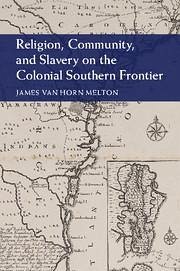
Religion, Community, and Slavery on the Colonial Southern Frontier
Versandkostenfrei!
Versandfertig in 1-2 Wochen
111,99 €
inkl. MwSt.
Weitere Ausgaben:

PAYBACK Punkte
56 °P sammeln!
This book tells the story of Ebenezer, a frontier community in colonial Georgia founded by a mountain community fleeing religious persecution in its native Salzburg. This study traces the lives of the settlers from the alpine world they left behind to their struggle for survival on the southern frontier of British America. Exploring their encounters with African and indigenous peoples with whom they had had no previous contact, this book examines their initial opposition to slavery and why they ultimately embraced it. Transatlantic in scope, this study will interest readers of European and Ame...
This book tells the story of Ebenezer, a frontier community in colonial Georgia founded by a mountain community fleeing religious persecution in its native Salzburg. This study traces the lives of the settlers from the alpine world they left behind to their struggle for survival on the southern frontier of British America. Exploring their encounters with African and indigenous peoples with whom they had had no previous contact, this book examines their initial opposition to slavery and why they ultimately embraced it. Transatlantic in scope, this study will interest readers of European and American history alike.













